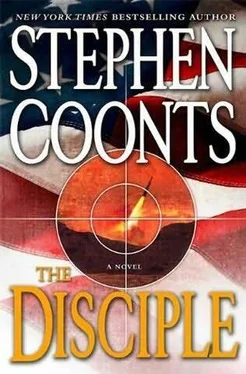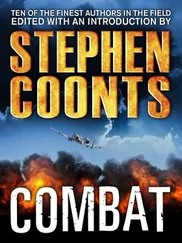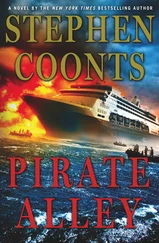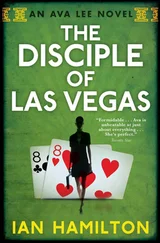Stephen Coonts - The Disciple
Здесь есть возможность читать онлайн «Stephen Coonts - The Disciple» весь текст электронной книги совершенно бесплатно (целиком полную версию без сокращений). В некоторых случаях можно слушать аудио, скачать через торрент в формате fb2 и присутствует краткое содержание. Жанр: Триллер, на английском языке. Описание произведения, (предисловие) а так же отзывы посетителей доступны на портале библиотеки ЛибКат.
- Название:The Disciple
- Автор:
- Жанр:
- Год:неизвестен
- ISBN:нет данных
- Рейтинг книги:4 / 5. Голосов: 1
-
Избранное:Добавить в избранное
- Отзывы:
-
Ваша оценка:
- 80
- 1
- 2
- 3
- 4
- 5
The Disciple: краткое содержание, описание и аннотация
Предлагаем к чтению аннотацию, описание, краткое содержание или предисловие (зависит от того, что написал сам автор книги «The Disciple»). Если вы не нашли необходимую информацию о книге — напишите в комментариях, мы постараемся отыскать её.
The Disciple — читать онлайн бесплатно полную книгу (весь текст) целиком
Ниже представлен текст книги, разбитый по страницам. Система сохранения места последней прочитанной страницы, позволяет с удобством читать онлайн бесплатно книгу «The Disciple», без необходимости каждый раз заново искать на чём Вы остановились. Поставьте закладку, и сможете в любой момент перейти на страницу, на которой закончили чтение.
Интервал:
Закладка:
What he didn’t know was that Ahmadinejad and Hazra al-Rashid had been playing two hands at once. Perfectly willing to have the world believe they were manufacturing nuclear weapons, they had used the Azari connection to let the world think they were several years away from operational warheads, when in reality Iran was much closer.
“We have tricked those fools,” Ahmadinejad had chortled.
Or they have tricked us , Sultani thought then, although he didn’t make that remark aloud.
Now, this afternoon, he advised the president that his attempt to get an assessment of how the Americans’ latest electronic magic was performed had failed. “The American fighters refused to take the bait,” he said in summation.
“We must put more pressure on the Russians,” Ahmadinejad said. “Those liars! The promises they made, the lies they told… They know the Americans’ secrets and are not sharing with us.”
Back in his roost at the Defense Ministry, Sultani rubbed his chin and tried to envision how Iran could gain access to one of the Americans’ magic boxes, which he knew were in their frontline warplanes, those carrier jets that flew boldly up and down the Persian Gulf with impunity. We could always shoot one down, he thought. Or arrange a midair collision, so that one crashes and we are first to gain access to the wreckage. He thought about the crash of the F-18. The pieces of the airplane were still out there in the Strait of Hormuz, which was deep, with swift tidal currents-and, of course, it had crashed beyond the territorial limits. If there was a magic black box somewhere on the floor of that strait, Iran lacked the technology to find it. No, that box was beyond reach, although there were plenty of others.
The real issue, he well knew, was the vulnerability of Iran’s nuclear program to a conventional air attack. The Iranians had spent over twenty billion dollars moving the entire weapons program underground. Entire underground cities had been created to house the enrichment facilities, the manufacture of neutron generators, the bomb plant itself and the missile factories. Only the reactors were still aboveground: unfortunately, they could not be moved. Everything else, including the spent fuel that was being enriched, was buried deep in bombproof tunnels bored into solid granite. Or built under the city of Tehran itself.
The real question, Sultani decided, was when the enemies’ window of opportunity would close. At what point would an attack be futile, pointless, unable to stop Iran’s march to the bomb?
He removed the files holding the plans for the tunnels and the overview of the program from a safe behind his desk and spread them out so that he could study them. The conversion of uranium from yellowcake, a solid, into a gas, uranium hexafluoride (UF6), was proceeding nicely at Isfahan. This was a major industrial operation, and it took place underground. But if the facility were attacked with conventional weapons, would the underground factory be able to sustain operations? This required a calculation of how much damage the bombs might inflict on the hardened site. Of course, any breach of the tanks containing the radioactive gas would cause serious contamination. Perhaps the entire cavern would be unusable. Certainly the radiation would kill everyone there.
Still, the off-site stockpile of UF6 was adequate and growing by the day. That stockpile was held in four locations, all inside tunnels carved into mountains.
The next step in the process was to raise the concentration of the U-235 isotope in the UF6 from its natural level of.7 percent to between 3 percent and 5 percent by the use of centrifuges. The product the centrifuges produced was called low-enriched uranium, or LEU. The cascade centrifuges at Natanz were 160 feet underground. This process took approximately 70 percent of the time and effort necessary to get to the final product, which was highly enriched uranium, HEU, containing weapons-grade concentrations of over 90 percent U-235.
Of course, even if Natanz was destroyed, Iran also had a laser enrichment facility and a heavy water facility, all hardened.
The detonator and warhead factories were also deeply underground.
All these facilities were protected by Russian S-300 antiaircraft systems, which fired the SA-20 surface-to-air missile at attacking planes. In Syria, this system failed to detect the inbound Israeli bombers.
Habib Sultani carefully studied the LEU and HEU production levels.
Finally he sighed and began arranging the materials back in his file.
Two weeks, he decided. In two weeks Iran would have enough HEU to manufacture twelve warheads. Regardless of what happened after that, bomb assembly could continue deep within the earth. If the Israelis or Americans attacked before that, they would of course do some damage, release some radioactivity, and delay the production of U-235. However, Sultani concluded, the time when they could shut down the program with conventional weapons had already passed.
There was nothing short of nuclear war that the Israelis and Americans could do to prevent Iran from becoming a nuclear power.
Twelve nuclear warheads, mounted on missiles hidden in deep tunnels in solid granite mountains. The missiles could be run out of their tunnels and fired in minutes.
Twelve warheads should satisfy Ahmadinejad , Sultani thought.
Callie was in bed Saturday night when Jake heard his doorbell ring. He padded to the front door and peered through the peephole. Sal Molina was standing there.
Grafton unlocked the door, held it open and said, “Come in, come in.”
“Can a man get a drink around here?” Molina asked.
“If he has plain tastes and isn’t a connoisseur of the finer things in life.”
“I’ve been accused of a lot of things,” Molina said with a sigh, “but no one ever called me a connoisseur.”
As they walked toward the kitchen, Molina muttered, “You alone?”
“Callie is in bed. Name your poison.”
“Bourbon. It’s not just for breakfast anymore.”
Callie came out in a robe and said hello, then made her excuses and went back to bed. Settled in Grafton’s den with the door closed, Molina said, “I was on my way home and thought maybe you could tell me something that would make me sleep better.”
“I doubt it, but ask away.”
“You’ve been at the CIA… what? Three years?”
“About.”
“What’s your assessment of the agency?”
“I’m not going to trash my boss.”
“This is off the record. I want an honest opinion, if there is such a thing inside the Beltway.”
Jake Grafton took his time answering. He sipped his drink-he was having bourbon, too-then said, “The Company is a large, fossilized bureaucracy. Most of the people there are mediocre, at best. A serious number are incompetent. Most case officers don’t speak the language of their subject countries. No one reads the area newspapers. The analysts’ reports are often treacle-all they do is look at satellite photography and radio intercepts. Human intelligence is not high on the priority list and hasn’t been for a generation. A lot of the agency’s people are working their way to retirement by doing nothing that makes waves-most bureaucracies are like that. This one is no different.” He turned over a hand. “How much more do you want?”
Molina made a face. “That’s enough, I guess.” He worked on his drink. “How likely are we to find out what Iran is going to do with its nuke warheads, which the agency says it isn’t building?”
“The agency said it has no hard evidence Iran is building nuclear warheads,” Grafton said, correcting Molina. “The turtle has pulled its head into its shell.”
“What about these op-ed pieces Professor Azari has been writing? They’re full of facts and figures. He’s making us look like total idiots.”
Читать дальшеИнтервал:
Закладка:
Похожие книги на «The Disciple»
Представляем Вашему вниманию похожие книги на «The Disciple» списком для выбора. Мы отобрали схожую по названию и смыслу литературу в надежде предоставить читателям больше вариантов отыскать новые, интересные, ещё непрочитанные произведения.
Обсуждение, отзывы о книге «The Disciple» и просто собственные мнения читателей. Оставьте ваши комментарии, напишите, что Вы думаете о произведении, его смысле или главных героях. Укажите что конкретно понравилось, а что нет, и почему Вы так считаете.












